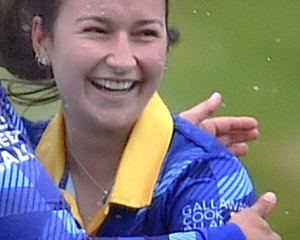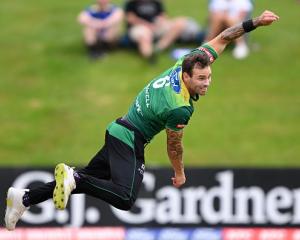
McCullum testified against his former teammate in last December's perjury trial at Southwark Crown Court in London, during which Cairns was found not guilty of charges relating to alleged match-fixing.
Last night, ahead of today's release of his autobiography Declared, McCullum lashed out at Cairns during an interview with Seven Sharp. He said the fact the court case became "about me versus [Cairns] is something I'll never understand".
"Under pressure, people show their true character. It's not the character I thought I knew, and I guess I can never forgive him for that."
McCullum, who retired as New Zealand captain in February, said he had no regrets about his decision to testify against Cairns, even if it meant irreparable harm to the pair's relationship.
"I didn't have to testify. I think that's something that people don't understand. And I'm pretty sure lots of people wouldn't do what I did. But I felt I had an obligation, especially as captain of New Zealand, to go over and tell my side of the story.
"I was prepared to stand up, even under pressure and under fire from various quarters, and do what I thought was morally right at the time.
"I'm sure [Cairns] will get on with his life, and I'll get on with mine, and let's hope they never cross paths."
McCullum reveals in his book that the stress of being a key witness at the trial played a part in his decision to retire early.
He says he originally planned to play at this year's T20 World Cup in India, then concentrate solely on test matches to prolong his career.
McCullum said he made the "sudden and emotional" decision to retire during a conversation with coach Mike Hesson part-way through a difficult tour of Australia at the end of 2015.
McCullum was having a "durry" after making a typically swashbuckling 49 against a West Australia XI at the WACA in Perth.
In his book, McCullum said he was thinking: "I've come to the end of my tether. I just know in my waters I've had enough."
The pressure of playing international cricket had worn thin, but McCullum said the public scrutiny of his decision to give evidence at Cairns' trial had also taken its toll.
McCullum told the jury that Cairns, his former team-mate and friend, approached him to fix matches on two occasions in 2008.
The trial was high profile with a number of other New Zealand cricketers, such as Dan Vettori, Shane Bond, Chris Harris, Andre Adams, Kyle Mills and former Australian captain Ricky Ponting also giving evidence.
Cairns denied the match-fixing allegations and was acquitted of charges of perjury and perverting the course of justice in December 2015 after a nine-week trial at the Southwark Crown Court in London.
McCullum's recollection of his thoughts during the trial, before Cairns was found not guilty, continue: "All this has led to constant speculation by media and social media, and, of course, because I'm one of the three prime witnesses for the prosecution, my name is constantly at the forefront of speculation as to Cairns' guilt or innocence.
"Some of the conjecture has been ridiculous, and from people who should know better, and some of it is downright nasty.
"I've tried desperately hard to keep my head locked into the very demanding cricket right in front of me, but to be honest, it's impossible to ignore the fallout from the trial completely, and it's been chipping away at me like Chinese water torture right through the Australian tour."
McCullum was one of three key Crown witnesses against Cairns. The others were disgraced former cricketer Lou Vincent and Vincent's ex-wife Elly Riley.
In summing up the case, Justice Nigel Sweeney said the jury had to be sure of the evidence of at least two of the three key Crown witnesses to convict Cairns of perjury.
Vincent was discredited as a confessed match-fixer, while Riley's evidence was about alleged confessions from Cairns on a drunken night out.
There was no independent physical evidence to support what the key witnesses were saying.
McCullum writes that he might not have agreed to be a witness had he known the Crown would rely on him so heavily. The book continues:
"I simply don't understand why the jury cannot disregard Lou and Elly's evidence if they don't believe it, and still reach a verdict based on whether they believe me or Cairns," said McCullum.
"I'm not saying that would happen - in my opinion, Sweeney casts aspersions on my evidence too - but if I'd known at the outset what the equation was going to be, two out of three, it would have been a fairly compelling reason not to bother going to London, not to put myself and my family through this crap."
How the saga unfolded
2006: Chris Cairns ends 17-year international cricket career with 200 wickets and 3000 test runs, considered one of the great all-rounders.
2007: First edition of rebel Indian Cricket League starts. The T20 tournament is unsanctioned by the International Cricket Council, so those who sign cannot play for their countries. Cairns signs $US170,000 ($NZ235,000) deal with the Chandigarh Lions.
2008: Second edition of ICL starts. Lou Vincent signs $US350,000 ($NZ484,000) contract with Chandigarh to play alongside Cairns and fellow former New Zealand team-mate Daryl Tuffey. Cairns' contract is worth $US1 million ($NZ1.38 million) over three years.
Vincent offered cash and sex to fix games for Varun Gandhi. Vincent alleges Cairns recruited him to fix games for him instead. Cairns denies this. Vincent underperforms in ICL and later in United Kingdom.
Cairns allegedly travels to Kolkata and meets Brendon McCullum about a business proposal a few days before the start of the Indian Premier League, a sanctioned T20 tournament.
McCullum, signed with Kolkata Knight Riders, alleges Cairns approached him to fix matches. Cairns denies this.
Cairns is later dismissed from the ICL. The reason given is an undisclosed ankle injury affecting his performance.
2010: Lalit Modi, one of the most powerful men in cricket, posts Twitter message saying Cairns was removed from IPL auction due to "past record of match-fixing".
2011: ICC anti-corruption campaigner John Rhodes gives presentation to New Zealand team.
McCullum, now realising he has to report corrupt approaches, gives statement to Rhodes about alleged approach from Cairns.
2012: Cairns gives evidence in libel trial at Royal Courts of Justice in London. Wins and is awarded £90,000 in damages. Modi also has to pay Cairns' legal bill, believed to be more than £1 million.
2013: Vincent confesses match-fixing to Heath Mills, head of the New Zealand cricket players' union. The New Zealand Herald breaks story about ICC probe into three former New Zealand internationals.
2014: Vincent receives 11 life bans from cricket for 18 breaches of anti-corruption rules. Cairns charged with perjury and perverting the course of justice.
2015: Cairns is acquitted after a nine-week trial at the Southwark Crown Court in London.











